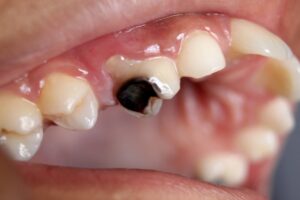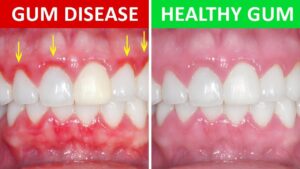
November is Diabetes Awareness Month, and November 14th has been deemed World Diabetes Day. The date was chosen in honour of Canadian Sir Frederick Banting who, together with Charles Best, discovered insulin.
The discovery of insulin changed lives, but more Canadians have diabetes than ever before.
Oral infections can make it difficult to control diabetes and cause complications, since the bacteria from severe gum disease may increase both blood sugar levels and the length of time the body struggles with high blood sugar.
High blood sugar can damage gums and teeth in the same way that it can damage the heart, eyes, and nerves. As a result, people with diabetes are at higher risk for tooth decay, gum inflammation and disease, and periodontitis (a severe gum infection that destroys the bone supporting your teeth)
If diabetes is left untreated, it can take a toll on your mouth in the following ways:
Tooth decay

Starches and sugars in food and beverages interact with naturally occurring bacteria in the mouth, forming acids that can attack the teeth and lead to cavities. The higher the blood sugar level, the greater the supply of sugars – and the more acid to decay the teeth.
Infection and slower healing
Diabetes increases the risk of infection and also slows healing, so any dental surgery will take longer to heal.
Sugary saliva
Diabetes raises sugar (glucose) levels not only in your blood but also in your saliva. This can cause a fungal infection known as thrush, which produces a white coating on the tongue. This can lead to bad breath and a burning sensation in your mouth, and change your ability to taste.
Gum disease

Gum disease can range from gingivitis (slightly inflamed or swollen gums) to periodontitis. People with diabetes are at especially high risk of serious gum disease because the sugar in their saliva helps bacteria grow, and high blood sugar lowers their body’s ability to fight infection.
Over time, the buildup of plaque bacteria, which collects at the gum line, eventually hardens into calcium deposits called calculus or tartar. If the tartar isn’t removed with professional scaling by a dental hygienist, the bacteria can cause inflammation of the gums (gingivitis), penetrate the gum line and finally spread into the underlying bone.
If left untreated, gum disease can result in abscesses or the complete destruction of the tooth’s supporting tissues and, ultimately, tooth loss. Gum disease tends to be more severe among people who have diabetes because the disease lowers the ability to fight infection and slows healing.
Dry mouth
High blood sugar levels cause the body to make more urine; as a result, there is less water available in other parts of the body, including the mouth. The result is a dry mouth, which is one reason why excessive thirst is an early sign of diabetes.
Dry mouth is a risk for poor oral health, including plaque and tooth decay, because there is not enough saliva to wash away any bacteria.
It can also affect chewing, speaking, swallowing and the ability to taste.
For oral care tips and ways to prevent dental problems if you suffer from diabetes, check out our blog post here.
If you suffer from diabetes and want to learn more about how the North Delta Dental team can help, contact us today to book an appointment!